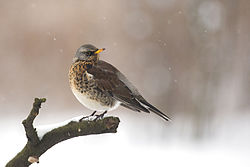пелыськай
Hello, you have come here looking for the meaning of the word пелыськай. In DICTIOUS you will not only get to know all the dictionary meanings for the word пелыськай, but we will also tell you about its etymology, its characteristics and you will know how to say пелыськай in singular and plural. Everything you need to know about the word пелыськай you have here. The definition of the word пелыськай will help you to be more precise and correct when speaking or writing your texts. Knowing the definition ofпелыськай, as well as those of other words, enriches your vocabulary and provides you with more and better linguistic resources.

Пелыськай.
Komi-Zyrian

Etymology
From пелысь (pelyś, “mountain ash, rowan”) + кай (kaj, “little bird, birdie”).
Pronunciation
Noun
пелыськай • (pelyśkaj)
Declension
| singular | plural | ||
|---|---|---|---|
| nominative | пелыськай (pelyśkaj) | пелыськайяс (pelyśkajas) | |
| accusative | I 1 | пелыськай (pelyśkaj) | пелыськайяс (pelyśkajas) |
| II 1 | пелыськайӧс (pelyśkajös) | пелыськайясӧс (pelyśkajasös) | |
| instrumental | пелыськайӧн (pelyśkajön) | пелыськайясӧн (pelyśkajasön) | |
| comitative | пелыськайкӧд (pelyśkajköd) | пелыськайяскӧд (pelyśkajasköd) | |
| caritive | пелыськайтӧг (pelyśkajtög) | пелыськайястӧг (pelyśkajastög) | |
| consecutive | пелыськайла (pelyśkajla) | пелыськайясла (pelyśkajasla) | |
| genitive | пелыськайлӧн (pelyśkajlön) | пелыськайяслӧн (pelyśkajaslön) | |
| ablative | пелыськайлысь (pelyśkajlyś) | пелыськайяслысь (pelyśkajaslyś) | |
| dative | пелыськайлы (pelyśkajly) | пелыськайяслы (pelyśkajasly) | |
| inessive | пелыськайын (pelyśkajyn) | пелыськайясын (pelyśkajasyn) | |
| elative | пелыськайысь (pelyśkajyś) | пелыськайясысь (pelyśkajasyś) | |
| illative | пелыськайӧ (pelyśkajö) | пелыськайясӧ (pelyśkajasö) | |
| egressive | пелыськайсянь (pelyśkajśań) | пелыськайяссянь (pelyśkajasśań) | |
| approximative | пелыськайлань (pelyśkajlań) | пелыськайяслань (pelyśkajaslań) | |
| terminative | пелыськайӧдз (pelyśkajödź) | пелыськайясӧдз (pelyśkajasödź) | |
| prolative | I | пелыськайӧд (pelyśkajöd) | пелыськайясӧд (pelyśkajasöd) |
| II | пелыськайті (pelyśkajti) | пелыськайясті (pelyśkajasti) | |
1 Animate nouns almost exclusively take the type II accusative ending, whereas inanimate nouns can be used with either ending, but are more often found with type I.
1 Animate nouns almost exclusively take the type II accusative ending, whereas inanimate nouns can be used with either ending, but are more often found with type I.
1 Animate nouns almost exclusively take the type II accusative ending, whereas inanimate nouns can be used with either ending, but are more often found with type I.
1 Animate nouns almost exclusively take the type II accusative ending, whereas inanimate nouns can be used with either ending, but are more often found with type I.
1 Animate nouns almost exclusively take the type II accusative ending, whereas inanimate nouns can be used with either ending, but are more often found with type I.
1 Animate nouns almost exclusively take the type II accusative ending, whereas inanimate nouns can be used with either ending, but are more often found with type I.
1 Animate nouns almost exclusively take the type II accusative ending, whereas inanimate nouns can be used with either ending, but are more often found with type I.
| ||||||||||||||||||||||||||||||||||||||||||||||||||||||||||||||||||||||||||||||||||||||||||||||||||||||||||||||||||||||||||||||||||||||||||||||||||||||||||||||||||||||||||||||||||||||||||||||||||||||||||||||||||||||||||||||||||||||||||||||||||||||||||||||||||||||||||||||||||||||||||||||||||||||||||||||||||||||||||||||||||||||||||||||||||||||||||||||||||||||||||||||||||||||||||||||||||||||||||||||||||||||||||||||||||||||||||||||||||||||||||||
References
- L. M. Beznosikova, E. A. Ajbabina, R. I. Kosnyreva (2000) Коми-русский словарь , →ISBN, page 487
